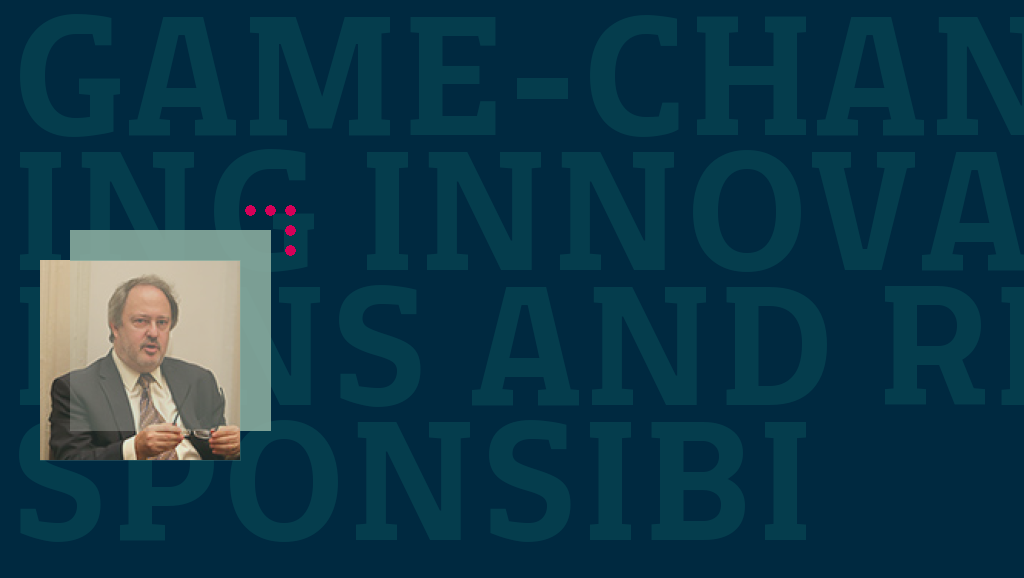On November, 14th, The Fondazione Bassetti had the honor to host Professor David Guston, Founding Director of the School for the Future of Innovation in Society and Co-Director of the Institute for the Future of Innovation in Society Arizona State University.
Professor Guston spoke on Synbio and he held a lecture titled “From Frankenstein to Synthetic Biology: Responsible Innovation and the Insufficiency of ‘Cool’“.
We publish video of the entire lecture including the debate, podcast, slides and photographs (see below).
The Lecture was introduced by Angela Simone, scientific journalist and Foundation Project Manager.
Here find the text of her presentation (videos and slides are below):
Introduction by Angela Simone.
“– Thanks – Good evening all – I am delighted to be able to introduce the topic of this event before leaving the floor to our guest, professor David Guston, and to the dialogue with all of you later on.
I just would like to provide you some elements to frame our discussion, about the theme that we explore today, which is, as you know, Synthetic Biology.
It’s no coincidence that at this event we look into this potentially high trasformative technology. Since its inception the Bassetti Foundation has been scrutinizing frontier research and disruptive technologies such as nanotechnology, biotechnology and genetic engineering, neurosciences, ICT, robotics and AI – just to mention a few – to identify and highlight intertwined societal needs, ethical values and environmental issues in order to stimulate researchers, innovators, policymakers and society at large to jointly embrace the concept and practices of responsible innovation.
More recently, the Bassetti Foundation has been engaged, together with relevant European players, to bring the principles of Responsible Research and Innovation – also known in the EU context as RRI – to industry, business and the entrepreneurial sector, thanks to a project called SMART-map, supported by the European Commission under the Horizon2020 programme for Research and Innovation.
The Bassetti Foundation, along with partners from Denmark, Germany, Hungary, Spain and the UK, will have the duty and the chance to gather industry, research and societal actors to co-design concrete RRI roadmaps addressing the industrial field in three game-changing innovation topics: Precision Medicine, 3D printing in biomedicine and Synthetic Biology.
The Foundation will have a key role in debating and structuring the future of the industrial 3D printing sector in biomedicine according to RRI principles with local and international stakeholders, and we are convinced that precision medicine as well as Synthetic Biologiy are strategic and crucial innovations for our audience in Milan, worthwhile of investigation, discussed or even questioned during parallel events to the SMART-map project.
Hence, today Syntehtic Biology is at the centre of our debate.
Situated at the interfaces of biotechnology, ICT and nanotechnology, synthetic biology, also called SynBio, can be defined as “the artificial design and engineering of biological systems and living organisms for purposes of improving applications for industry or biological research”. In other words, Synbio consists in synthetically creating organic molecules and matter to replace or edit biological and organic materials. Moreover, Synbio has the potential and the ambition to design and create entire living organisms from scratch. This new technology could have different applications, for example in bioremediation or in solving environmental issues, thus playing a major role in renewable fuels, sustainable energy and green chemistry fields. But Synbio could also revolutionise the healthcare system, since some of its key applications impact on pharmaceutical industries and care at large. The most promising and tantalizing tecnique is the so-called CRISPR-Cas9 technology, which is a specific, low cost, easy-to-use genome editing technique. CRISPR-Cas9 has substantially improved researchers’ ability to make precise changes in the genomes of living organisms, in order to correct genetic mutations in affected tissues and cells as well as to modify microorganisms and animals (like pigs or mosquitoes) to render them useful or not harmful for human beings. For instance some applications of this technology are intended to stop the outbreak of specific dangerous virus or to produce human organs in animals for xenotransplantations.
For all of these reasons above, synthetic biology could provide a set of disruptive technologies with a great economic impact, but that can also raise controversial issues, since it could affect or violate existing normative values.
Learning from the turbulent experience of GMOs and green biotechnology in the past, so before entering into the industrial sphere and before starting its broad commercial usage and deployment, Synbio should be at the centre of a wide and inclusive societal discussion in order to eventually regulate the sector according to appropriate governance frameworks, which are needed to be aligned with societal values, concerns and needs since the impact of this technology has the potential to create disparities and clashes among generations.
In such a scenario, it is essential to point out what is at stake when we modify or produce a living organism from scratch, when we manipulate embryo and germline cells, when we release a novel or modified living organism into the environment that is different from those we may find in nature. Therefore this kind of debate is not just a matter of discussing how to balance risks and opportunities but goes straight to question our ideas of democracy and human rights. In short, it challenges our multi-cultural and multi-religious societies to reflect upon how we want to design our future.“
————-
Some photos from event:
————-
















